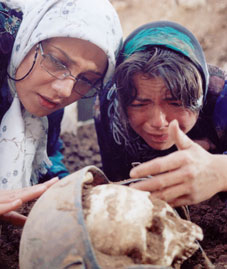 One of the best films of the 26th Fajr International Film Festival (February 2008) was The Child of the Earth directed by Mohammad-Ali Basheh-Ahangar. It won prizes for the best supporting actress (Mahtab Nassirpour) and the best film in the national cinema category and was also acclaimed by critics. It came fourth in a poll conducted among Film Monthly critics. This is a war movie unlike other Iranian war movies. Plenty of war films have been made in Iran but one cannot find any difference between their tone and structure. This one has a new motif; one that is shocking and regretful for many viewers. The story of this film is about trading the remains of Iranian soldiers of the 1980s Iran-Iraq War at the Kurdish inhabited border area between the two countries. This is not fiction. It has its roots deep in reality. During the first Persian Gulf War and following occupation of Kuwait by Iraqi forces and the attack on Iraq by the US-led coalition, there was relative independence in some of the Kurdish inhabited areas. Before that, Iranian body search groups were sometimes arrested by Iraqis. At that point, the Iranians took advantage of the opportunity and suggested to Iraqi Kurdish women and girls to get paid for finding the remains of Iranian soldiers. The proposal was widely welcomed in the region and many people made a living in this way for quite a few years.
One of the best films of the 26th Fajr International Film Festival (February 2008) was The Child of the Earth directed by Mohammad-Ali Basheh-Ahangar. It won prizes for the best supporting actress (Mahtab Nassirpour) and the best film in the national cinema category and was also acclaimed by critics. It came fourth in a poll conducted among Film Monthly critics. This is a war movie unlike other Iranian war movies. Plenty of war films have been made in Iran but one cannot find any difference between their tone and structure. This one has a new motif; one that is shocking and regretful for many viewers. The story of this film is about trading the remains of Iranian soldiers of the 1980s Iran-Iraq War at the Kurdish inhabited border area between the two countries. This is not fiction. It has its roots deep in reality. During the first Persian Gulf War and following occupation of Kuwait by Iraqi forces and the attack on Iraq by the US-led coalition, there was relative independence in some of the Kurdish inhabited areas. Before that, Iranian body search groups were sometimes arrested by Iraqis. At that point, the Iranians took advantage of the opportunity and suggested to Iraqi Kurdish women and girls to get paid for finding the remains of Iranian soldiers. The proposal was widely welcomed in the region and many people made a living in this way for quite a few years.
Mohammad-Ali Basheh-Ahangar has been born in Abadan 46 years ago. Abadan is a major city in the oil-rich region in southern Iran and was besieged by Iraqi forces for a couple of years at the start of the war with Iraq. He was present in the war and has first-hand experience of fighting it. He used to live in Abadan while the war was raging. His wife took care of the house and he used to go to war. At lunchtime, he went back home on bicycle to take a rest and then returned to the war zone in the afternoon. In the middle of the war, there was also regular entertainment such as playing football. He was a teammate of Habib Ahmadzadeh, a well-known and successful novelist who writes about the war. When they heard the whistle of a mortar, they used to lie down on the ground and when everything was over, the referee used to blow in his whistle and the game started again.
Mohammad-Ali Basheh-Ahangar liked the movies as an adolescent. During the war, he launched a few movie houses for soldiers. He used to do publicity for viewing session over a loudspeaker. Even Iraqis could hear his voice and sometimes, more attacks followed. Mohammad-Ali Basheh-Ahangar believed that presence of cinema in the city proved that it was still alive. ...
SUBSCRIBE

